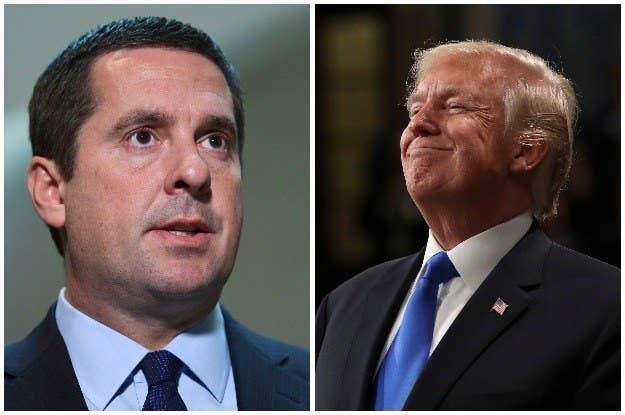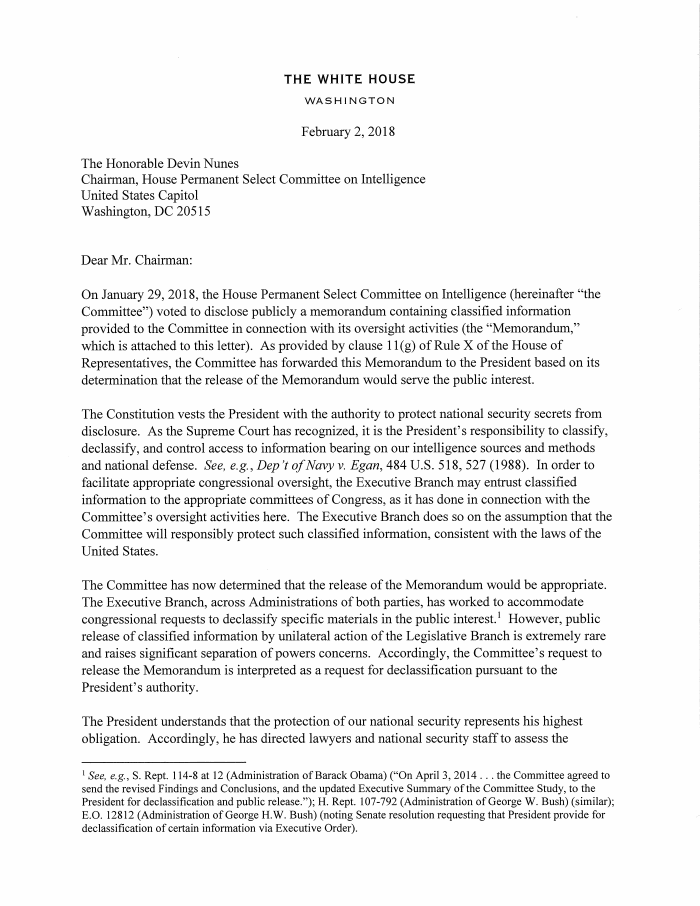
The House Intelligence Committee on Friday released the once-secret Republican memo that has been a flashpoint in American politics for weeks, after President Trump decided that it should be made public.
The memo is at the center of a controversy over the Justice Department’s investigation of possible collusion between the Trump’s presidential campaign and the Russian government. (Read the memo here.)
The four-page memo details how top officials at the Department of Justice and the FBI, including former FBI Director James Comey, Deputy Attorney General Rod J. Rosenstein, former Deputy Attorney General Sally Yates, and others green-lit applications to surveil Carter Page, a former foreign policy advisor to the Trump campaign. The memo, written by Republican staff on the committee, contends that officials didn’t adequately explain to a Foreign Intelligence Surveillance Court judge that the application relied on research by former British MI6 intelligence official Christopher Steele that was funded by the Democratic National Committee. Steele wrote a dossier that alleged several years of Trump-Kremlin links.
The Steele dossier was partially funded by the Democratic National Committee and the presidential campaign for Hillary Clinton. The dossier was first published by BuzzFeed News last January after security officials had briefed then-president Barack Obama and Trump about it.
The memo was written by the Republican committee staff under the direction of its chairman, Devin Nunes. In a statement, Nunes said, “the American people have a right to know when officials in crucial institutions are abusing their authority for political purposes.
“Our intelligence and law enforcement agencies exist to defend the American people, not to be exploited to target one group on behalf of another. It is my hope that the Committee’s actions will shine a light on this alarming series of events so we can make reforms that allow the American people to have full faith and confidence in their governing institutions,” he said.
The top Democrat on the committee, Rep. Adam Schiff, called the decision to make the memo public “a shameful effort to discredit” the DOJ and the FBI and “undermine the Special Counsel’s ongoing investigation, and undercut congressional probes.”
“The selective release and politicization of classified information sets a terrible precedent and will do long-term damage to the Intelligence Community and our law enforcement agencies. If potential intelligence sources know that their identities might be compromised when political winds arise, those sources of vital information will simply dry up, at great cost to our national security,” Schiff said. “The Republican document mischaracterizes highly sensitive classified information that few Members of Congress have seen, and which Chairman Nunes himself chose not to review.”
Democratic staff on the committee have prepared their own memo as a rebuttal to the Republican memo. It is expected to be publicly released in the coming weeks.
Comey, who Trump fired last year, tweeted on Friday that the Republican memo was “dishonest and misleading.”
Page, for his part, released a statement praising House Republicans for releasing the memo. “The brave and assiduous oversight by Congressional leaders in discovering this unprecedented abuse of process represents a giant, historic leap in the repair of America’s democracy,” Page said. “Now that a few of the misdeeds against the Trump Movement have been partially revealed, I look forward to updating my pending legal action in opposition to DOJ this weekend in preparation for Monday’s next small step on the long, potholed road toward helping to restore law and order in our great country.”
As early as 2013, Page — who lived in Moscow from 2004 to 2007, and traveled there during the presidential campaign — was known to have interacted with a Russian spy. The allegations of wrongdoing in the memo center around the FBI and the DOJ’s apparent failure to “disclose or reference” the role the Democratic National Committee played in funding Steele’s research in the applications to spy on Page, as well as accusations that Steele had become an unreliable source for the FBI.
“Neither the initial application in October 2016, nor any of the renewals, disclose or reference the role of the DNC, Clinton campaign, or any party/campaign in funding Steele’s efforts, even though the political origins of the Steele dossier were then known to senior DOJ and FBI officials,” the memo says.
The memo, citing a top DOJ official with whom Steele corresponded, says Steele “was desperate that Donald Trump not get elected and was passionate about him not being president,” and that “evidence of Steele’s bias” was “not reflected in any of the Page FISA applications.”
“While the FISA application relied on Steele’s past record of credible reporting on other unrelated matters, it ignored or concealed his anti-Trump financial and ideological motivations,” the memo says.
Steele was motivated to bring his Trump research to the FBI by “professional obligations,” according to Glenn Simpson, the co-founder of Fusion GPS, the firm that commissioned the dossier. "I'm a former intelligence officer, and we're your closest ally,” Simpson, speaking to the House Intelligence Committee in November, recounted Steele saying. “You know, I have obligations, professional obligations. If there's a national security emergency or possible national security issue, I should report it."
The memo also confirms that the FBI opened its Russia investigation in July 2016 as a result of information regarding George Papadopoulos, another Trump campaign foreign policy adviser. The New York Times has reported that information Papadopoulos shared with the Australian ambassador to the United Kingdom was passed to the FBI, triggering the probe.
Congressional Republicans, much to the dismay of the Justice Department, have supported the release of the memo in hopes that it will show that the investigation of Russian interference in the 2016 presidential elections was biased in its early stages. Democrats contend the memo just cherry-picks information from the underlying intelligence it is based on.
And in a sharp rebuke to House Republicans on Wednesday, the FBI released a statement saying it has “grave concerns about material omissions of fact that fundamentally impact the memo’s accuracy.” It added, “The FBI was provided a limited opportunity to review this memo the day before the committee voted to release it.”
Trump authorized the declassification of the memo on Friday, telling reporters in the Oval Office, “A lot of people should be ashamed.” Earlier, he tweeted, “The top Leadership and Investigators of the FBI and the Justice Department have politicized the sacred investigative process in favor of Democrats and against Republicans - something which would have been unthinkable just a short time ago. Rank & File are great people!”
Press secretary Sarah Sanders said in a statement the memo was released "with input from the President’s national security team—including law enforcement officials and members of the intelligence community, for whom the President has great respect."
Republican Sen. John McCain slammed what he said were “partisan attacks” on the FBI and DOJ. “Our nation’s elected officials, including the president, must stop looking at this investigation through the warped lens of politics and manufacturing partisan sideshows,” McCain said in a statement. “If we continue to undermine our own rule of law, we are doing Putin’s job for him.”
When asked Friday if he would fire Rosenstein, who is overseeing special counsel Robert Mueller’s investigation, Trump said, “You figure that one out.”
The House Intelligence Committee voted Monday night to release the memo, sending the decision to Trump. The president had five days to object to the memo’s release. If he didn’t, the committee could then release the document.
On Tuesday, while he was leaving his State of the Union address, South Carolina Republican Rep. Jeff Duncan encouraged Trump to release the memo. “Oh, don’t worry, 100 percent,” Trump responded. “Could you imagine?” Trump added, pointing to someone nearby. “He’d be too angry.”
And in a twist late Wednesday night, Schiff tweeted there were changes made to the memo before it was submitted to the White House for possible release.
However, Republicans on the committee said the changes were “minor edits,” like grammatical fixes.
Still, Democrats wanted to recall the memo from the White House, and the House’s top Democrat, Nancy Pelosi, tweeted that the Republican chair of the House Intelligence Committee, Nunes, should be removed.


